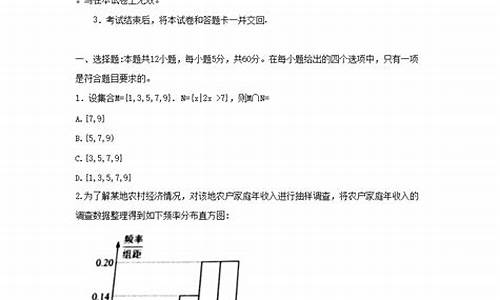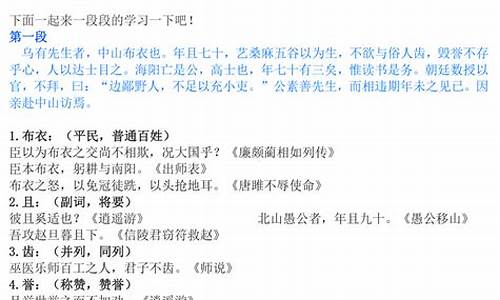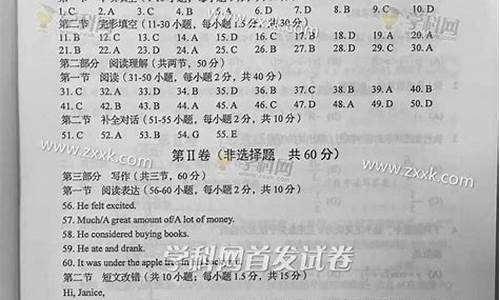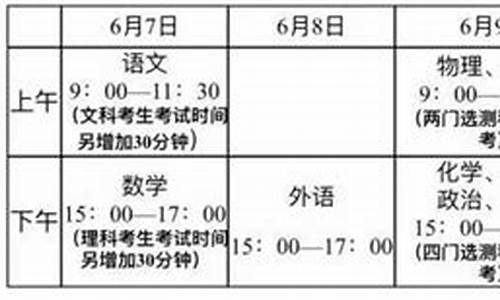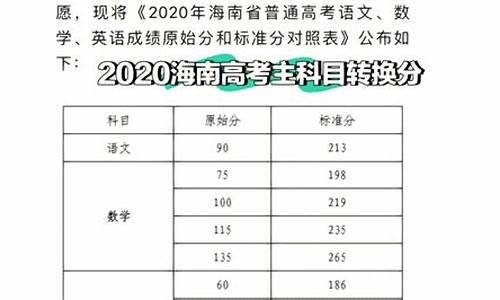2017高考英语官方,2017高考英语试题
1.高考英语阅读理解训练附答案
2.2017广东高考英语听说考试成绩公布查询时间什么时候
3.高考英语3500词解析版
4.2017年高考英语词汇详解:make的重要短语与固定搭配
5.河北英语高考题2017年
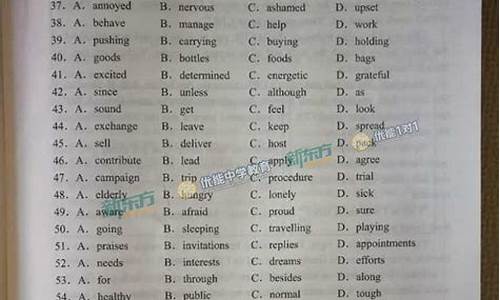
高考英语词汇分类讲解:数词的用法
1.表达编号
编号可用序数词或基数词表示,序数词位于名词之前,并加定冠词,基数词位于名词之后。一般情况下,用基数词较常见。
第8号:Number 8(读作number eight,缩写为No.8)
第109页:Page 109(读作page one hundred and nine)
第9行:Line 9(读作line nine或the ninth line)
第418房间:Room 418,Room No.418或the No.418 Room
12路公共汽车:Bus No.12,Bus 12 或the No.12 Bus
第5大街:Street No.5或the No.5 Street
电话号码009-902-435-7334:Tel.No.009-902-435-7334读作 telephone number zero,
zero,nine,(dash),nine,zero,two,(dash),four,three,five,(dash),seven,double three,four.
邮政编码100089:postcode (或zip code) 100089
注意:
电话号码中的0可读作zero或o[?u],双数如33可读作three,three或double three,中间的“-”号可读作dash,也可稍作停顿不读出。
2.表达年、月、日和年龄
公元前476年:476 B. C.读作four seven six B. C.或four seventy-six B. C.或four hundred seventy-six B. C.
公元381年:381 A. D.或 A. D.381读作three eighty-one A. D.或three hundred and eighty-one A. D.或three eight one A. D.
公元1900年:1900 读作nineteen hundred
公元1908年:1908 读作nineteen and eight或nineteen hundred and eight或one nine oh eight
2004年11月25日: November 25(th),2004或,25(th) November,2004读作November (the) twenty-fifth,two thousand and four
在2004年12月22日:on December 22,2004
在20世纪90年代:in the 1990s或in the 1990's
在七岁时:at the age of seven,at seven,at age seven。
一个七岁的女孩:a girl who is seven,a girl who is seven years old,a girl aged seven,a seven-year-old girl,a seven-year old girl,a girl of seven,a girl of seven years old
比较:
在表示时间时,汉语中常以“年—月—日”的顺序,而英语中常以“日—月—年”或“月—日—年”的顺序。2004年6月1日在英语中可写为:June 1,2004或1 June,2004或1/6/2004或1. 6,2004。在美国英语中也可写作6/1/2004或6. 1,2004。
必背:
在英语中月份的省略写法如下:
January—Jan.
February—Feb.
March—Mar.
April—Apr.
May—May
June—June
July—July
August—Aug.
September—Sept.
October—Oct.
November—Nov.
December—Dec.
高考英语阅读理解训练附答案
1、150分=140分(笔试)+10分(听说)
笔试考试时间和卷面分值不变,依然是2个小时,总分150。最后折算成140分,和听说成绩相加组成高考英语总分。
2、听说测试与笔试同步,一年两考
17届高考英语可以考两次,投档时取成绩较高的那次。
第一次考试:2017年1月
第二次考试:2017年6月
新增的听说测试,将和笔试同步,也是一年考两次。在计算高考总分时,笔试和听说成绩相对应(即第一次听说成绩只能和第一次笔试成绩折算相加,不可交叉匹配)。
3、听说与“+3”学科一样按等第制计分
听说测试卷面分20分,最后按等第制折算成10分。
大家对“等第制”这个词应该并不陌生,2017届高考实行的“+3”学科考试也是按照等第制计分。
你以为听说测试考了16分,折合以后计入高考的成绩是8分吗?错!
计算成绩时,会将全市所有学生的成绩放到一起,按等级划分,看你的分数是在哪个等级,再给到最终计入高考的成绩。
所以说,这个听说测试成绩没有最好,只有更好!多多练习,提高自己的听说能力,你就有机会拿到满分——10分!
4、听说是人机对话,由机器智能评分
此次新增的听说测试,完全由人工智能机器阅卷,利用最新的语音识别技术和智能评分引擎,对考生的听说能力进行综合评测。
人机对话的形式,对考生来说非常陌生。由于考试应答时间很短,基本不容许出错。
更大的压力还来自于机器的语音识别模式——机器是没有感情的!但是机器是一个程序化的系统,它的评分标准是人为设置好的,我们可以通过专项练习来无限接近人工智能的标准!
2017广东高考英语听说考试成绩公布查询时间什么时候
2017高考英语阅读理解训练附答案
2017高考英语改革后实行一年两考,可多次参加,我认为对自己有信心的.同学可以早点参加,取得理想的成绩后就可以把学习重心放到其他科目上。为了帮助大家备考,我整理了一些高考英语阅读理解,希望能帮到大家!
history
If we were asked exactly what we were doing a year ago,we should probably have to say that we could not remember But if we had kept a book and had written in it an account of what we did each day,we should be able to give an answer to the question.
It is the same in history Many things have been forgotten because we do not have any written account of them Sometimes men did keep a record of the most important happenings in their country,but often it was destroyed by fire or in a war.Sometimes there was never any written record at all because the people of that time and place did not know how to Write.For example,we know a good deal about the people who lived in China 4,000 years ago, because they could write and leave written records for those who lived after them.But we know almost nothing about the people who lived even 200 years ago in central Africa. because they had not learned to write. Sometimes.of course,even if the people cannot write,they may know something of the past.They have heard about it from older people,and often songs and dances and stories have been made about the most important happenings,and these have been sung and acted and told for many generations For most people are proud to tell what their fathers did in the past.This we may call ?remembered history?.Some of it has now been written down. It is not so exact or so valuable to us as written history is,because words are much more easily changed when used again and again in speech than when copied in writing.But where there are no written records,such spoken stories are often very helpful.
41. Which of the following ideas is not suggested in the passage?
A.?Remembered history?,compared with written history,is less reliable
B.Written records of the past play the most important role in our learning of the human history.
C.A written account of our daily activities helps US to be able to answer many questions.
D.Where there are no written records.there is no history.
42.We know very little about the central Africa 200 years ago because
A.there was nothing worth being written down at that time
B .the people there ignored the importance of keeping a record
C.the written records were perhaps destroyed by a fire
D.the people there did not know how to write
43.?Remembered history?refers to
A.history based on a person?s imagination
B .stories of important happenings passed down from mouth to mouth
C .songs and dances about the most important events
D .both B and C
44.?Remembered history?is regarded as valuable only when
A. it is written down
B .no written account is available
C.it proves to be time
D.people are interested in it
45 .The passage suggests that we could have learned much more about our past than we do now if the ancient people had
A.kept a written record of every past event
B. not burnt their written records in wars
C.told exact stories of the most important happenings
D.made more songs and dances
答案:DDDBA
land produces
Although the United States covers so much land and the land produces far more food than the present population needs,its people are by now almost entirely an urban society Less than a tenth of the people are engaged in agriculture and forestry(林业),and most of the rest live in or around towns,small and large.Here the traditional picture is changing:every small town may still be very like other small towns,and the typical small town may represent a widely accepted view of the country,but most Americans do not live in small towns any more.Half the population now lives in some thirty metropolitan areas(1arge cities with their suburbs、of more than a million people each?a larger proportion than in Germany or England,let alone France.The statistics(统计)of urban and rural population should be treated with caution because so many people who live in areas classified as rural travel by car to work in a nearby town each day.As the rush to live out of town continues.rural areas within reach of towns are gradually filled with houses,so that it is hard to say at what moment a piece of country becomes a suburb But more and more the typical American lives in a metropolitan rather than a small town environment.
36.If now America has 250 million people.how many of them are engaged in agriculture and forestry?
A.About 25 million.
B.More than 25 million.
C.Less than 25 million.
D. Less than 225 million
37.Which of the following four countries has the smallest proportion of people living in metropolitan areas?
A.United States.
B.Germany.
C.France.
D.England.
38.What?s the meaning of the word?metropolitan?in the middle of the passage?
A .Of a large city with its suburbs.
B.Of small and large towns.
C.Of urban areas.
D.Of rural areas.
39.According to the passage,what can we learn about small towns in the United States?
A Most small towns become gradually crowded
B.Small towns are still similar to each other.
C.As the traditional picture is changing,towns are different.
D .Small towns are turning into large cities
40.Why is it hard to say when a piece of country becomes a suburb?
A.Because they are the same.
B.Because the rush takes place too quickly
C.Because the process is gradual.
D.Because more and more Americans live in metropolitan
答案:CCABC
president
There are stories about two U.S . presidents,Andrew Jackson and Martin Van Buren,which attempt to explain the American English term OK.We don?t know if either story is true,but they are both interesting. The first explanation is based on the fact that President Jackson had very little education.In fact,he had difficulty reading and writing.When important papers came to Jackson,he tried to read them and then had his assistants explain what they said.If he approved of a paper.he would write?all correct?on it.The problem was that he didn?t know how to spell.So what he really wrote was?ol korekt?.After a while,he shortened that term to?OK?.
The second explanation is based on the place where President Van Buren was born,Kinderhook,New York.Van Bnren?s friends organized a club to help him become President They caned the club the Old Kinderhook Club,and anyone who supported Van Buren was called?OK?.
31.The author
A. believes both of the stories
B.doesn?t believe a word of the stories
C is not sure whether the stories are true
D. is telling the stories just for fun
32. According to the passage,President Jackson
A.couldn?t draw up any documents at all
B. didn?t like to read important papers by himself
C.often had his assistants sign documents for him
D .wasn?t good at reading,writing or spelling
33.According to the first story, the term ?OK?
A. was approved of by President Jackson
B.was the title of some Official documents
C.was first used by President Jackson
D.was an old way to spell?all correct?
34 .According to the second story,the term?OK?
A.was the short way to say?old Kinderhook Club?
B.meant the place where President Van Buren was born
C.was the name of Van Buren?s club
D.was used to call Van Buren?s supporters in the election
35.According to the second story.the term?OK?was first used
A.by Van Buren
B.in a presidential election
C.to organize the Old Kinderhook Club
D.by the members of the?Old Kinderhook Club?
答案:CDCDB
;高考英语3500词解析版
2017年广东高考英语听说考试成绩公布时间:4月28日
扩展资料:
广东高考英语听说考试成绩查询:
1.官方微信。官微在线查询方式关注广东省教育考试院官方微信,点击右下角“办事服务”菜单里的“成绩查询”
2.网站在线查询。网站在线查询方式考生可登录广东教育考试服务网及手机APP查询。
3.短信查询。
(一)广东地区联通用户可编写短信息“119+准考证号+4位出生年月(例:1998年8月,即9808)”,发送至10629500查询。
(二)广东地区移动用户可编写短信息“RWWW02+准考证号+4位出生年月(例:1998年8月,即9808)”,发送至10669500查询。
(三)中国移动用户编写短信息“RWA4+准考证号+4位出生年月”(例如准考证号是0123456789,出生年月是1996年6月,则发送:RWA401234567899606),发送至10669500即可查询。
(四)中国电信手机用户编写“KAF+准考证号+4位出生年月”(例如准考证号是0123456789,出生年月是1996年6月,则发送:KAF01234567899606,),发送至10622168即可查询。
4.电话查询。96040电话查询方式中国电信、中国联通用户只需拨通96040(全省均可直拨,无需加区号)按语音提示输入准考证号码(考生号)及4位出生年月,即可查询到高考英语听说考试成绩,考生也可以提前拨打96040对成绩信息进行短信通知预定,下发短信免费。
参考资料:
2017年高考英语词汇详解:make的重要短语与固定搭配
2017年高考英语3500词解析版C
1.●calculate v. 计算, 核算 It has been calculated that ?
eg. It has been calculated that at least 47000 jobs were lost last year.
(be) calculated to do sth. eg. The speech was calculated to win votes.
2. call v. 叫;喊;打电话 a girl called Mary a girl calling herself Mary
call on call at sp. call for call up call off call in
3. calm adj. 镇静的、沉着的 calm down v.使镇静 keep calm
4. camp n.营 v.野营;宿营 summer camp 夏令营 go camping 去野营
5. can 否定:cannot= can?t
can?t help doing = can?t help but do 禁不住
can not?too? = can never?too? 越?越好/再?也不为过
You can never be too careful when crossing the street.
6. care n. 照料;保管 take care of 照顾、保管 take care (that)?当心
v. 在乎;介意 I don?t care. 我不在乎/我不放在心上。
care for 喜欢;照顾 care about 关心;在乎
7. careful adj. 仔细的;小心的 be careful of? 当心,小心 listen carefully
8. carry v. 拿;搬;运;背 carry on 继续、进行 carry out 实施、执行
9. case n. 情况;案件;病例 in case +句子/in case of +名词 万一
in this/that case 如果这样/那样的话 in no case 绝不
as is often the case 事实往往如此 eg: As is often the case, women live longer than man.
10. ◎cash n. 现金 pay in cash /by check vt. 兑现 ~ a check
cash in on?从...获得利润 The shop are cashing in on temporary shortage by raising prices.
11.●cast v. 扔,抛,撒
cast your net wide cast about/ around for sth cast sb./ sth out
cast sb./ sth aside be cast away be cast down cast sth off
12. catch?caught?caught catch up with 赶上
catch sight of 看见 catch sb. doing 撞见/捉住某人做某事
catch one?s eye= attract one?s attention 引起某人注意;引人注目
13.●cater v. 提供(承办)酒席,满足需求
cater for sth/sb : The class caters for all ability ranges.
cater to sth/ sb: It catered for all tastes.
14. cattle n. 牛(总称)单复同形 The cattle are in the shed. 牛在牛棚里。
15. cause n. 原因、起因 cause and effect 因果
the cause of fire/cancer 火灾/癌症的起因
v. 引起;促使 The storm left, ____ a lot of damage to this area.
16. ◎cautious adj. 谨慎的 小心的 be cautious of/ about...
caution n. 谨慎 小心 with caution 小心地
vt. 警告...小心... caution sb. to do caution sb. against... 警告某人警惕 We were cautioned not to drive too fast.
17. celebrate v. 庆祝 celebrate one?s birthday celebrate Christmas
18.◎central adj. 中心的,中央的 central bank/
1) 主要的,首要的 play a central role in? 在?起着主导作用。
centre n. in the centre of the room
v. centre on /upon/ round /around?把?当中心 使?成为中心
19.◎ceremony n. 典礼,仪式 1) attend a wedding ceremony
2) stand on ceremony 拘于礼节 without ceremony 粗鲁无礼,不拘礼节
20. certain adj. 确定的;无疑的 certainly adv.
be certain of= be sure of 对?确信的' be certain to do =be sure to do 一定会、必然
make sure/certain of? 保证、弄清楚 * It is certain that?
21.◎challenge face/ take up a challenge 面对/接收挑战
challenging adj 具有挑战性的 a challenging job
22. chance n. 机会;可能性 give sb. a chance 给?一次机会;
take a chance/chances 冒险;碰运气 by chance/accident 偶然;
There is a/no chance that? 有可能/不可能?
23. change v. 改变、变化; n. 变化;零钱(不可数)
change?into? 把?变成; change one?s mind 改变主意
Great changes have taken place in China. Do you have any change on/with you ?
24.●characteristic adj. 独特的 n. 特征 特点 a key characteristic of?
25. charge n./vt charge?for? 收/要价多少;
charge sb. with sth/doing 指控某人做了 get the phone charged 手机被充电;
The soldiers were charging forward bravely.战士们勇敢地向前冲。
take charge of 负责、管理 in charge of 负责;
in the charge of 被/由? 负责; free of charge 免费
26. chat v./n. 聊天;闲谈 chat?chatted?chatted?chatting
have a chat with sb. 与某人聊天; chat room 聊天室
27. check v./ n. 检查;核对;批改; 支票 by check 用支票支付
辨析: check examine
check 指核对某事物是否正确, examine 表检查、调查、审查等
check the answers check the mailbox 核实邮箱(看有没有信)
examine your body/eyes examine the machine
28. cheer n./vi. 欢呼;喝彩A great cheer went up from the crowd.
cheer sb on 为某人加油 cheer up 振作起来;高兴起来 Cheers ! 共同举杯
29. ◎cheerful adj 兴高采烈的,高兴地 a cheerful smile
30. cheque= check(美) 支票 in cash 付现金 by check/cheque 用支票支付
31. chicken c/n. 小鸡 u/n. 鸡肉 Would you like some chicken? 来点鸡肉怎么样? Don?t count your chickens before they are hatched.
不要在还没孵出小鸡之前先数鸡。(别指望过早;别打如意算盘)
32. chief adj. 主要的;首要的 n. 首领;*** chiefs (复数)
33. choice c/n. 选择; choose v. 选择 choose?chose?chosen
make a choice /make choices 做选择 have no choice but to do 除了?别无选择
We chose Bill as chairman. There are a lot of books to choose from.
34. Christmas Merry Christmas! on Christmas Eve;
at Christmas 圣诞节期间 on Christmas 在圣诞节这天
河北英语高考题2017年
高考英语词汇详解:make的重要短语与固定搭配
1 . make a good person 成为……人。如:
He will make a good teacher. 他会成为一位好老师。
If you train hard, you’ll make a good footballer. 如果你努力训练,你就会成为一名优秀的足球运动员。
This coat makes a good present for my mother. 这件外套是送给我母亲的好礼物。
注:该结构中的 person, thing 要根据不同语境选择适当词语。
2 . make sb do sth 使某人做某事。如:
He made me repeat the story. 他要我把那事重讲一遍。
Rain makes plants grow. 雨水使植物生长。
I couldn’t make my car start this morning. 今天早上我的汽车发动不起来。
注:这类结构中不定式不带 to, 但在被动语态中须带 to。如:
He made me go there alone. / I was made to go there alone. 他要我一个人去那儿。
另外,这类结构一般不能将 do 换成 doing。如:
他的笑话使我们笑了。
正:His joke made us laugh.
误:His joke made us laughing.
3 . make sb done 使某人被……。如:
He tried to make his ideas known. 他设法让别人知道他的想法。
She made herself [her voice] heard across the room. 他大声说话,让房间另一头的人能听得见。
When he speaks English, he can’t make himself understood. 他说英语时还不能让人听懂他的意思。
许多在眼前看来天大的事,都不是人生一战,而只是人生一站。确实高考备战让你们很辛苦,可是已经坚持了这么久,这就已经是胜利。祝高考成功!下面是我为大家推荐的河北英语高考题2017年,仅供大家参考!
河北英语高考题2017年第I卷
注意事项:
1.答第I卷前,考生务必将自己的姓名、准考证号填写在答题卡上
2.选出每小题答案后,用2B铅笔把答题卡上对应题目的答案标号涂黑。如需改动,用橡皮擦干净后,再选涂其他答案标号。不能答在本试卷上,否则无效
第一部分听力(共两节,满分30分)
做题时,先将答案标在试卷上,录音内容结束后,你将有两分钟的时间将试卷上的答案转涂到答题卡上
第一节(共5小题;每小题1.5分,满分7.5分)
听下面5段对话。每段对话后有一个小题,从题中所给的A、B、C三个选项中选出最佳选项,并标在试卷的相应位置。听完每段对话后,你都有10秒钟的时间来回答有关小题和阅读下一小题题。每段对话仅读一遍。
例:How much is the shirt?
A.£19.15. B.£9.18. C.£9.15.
答案是C。
1. Where is Mary?
A. In the classroom. B. In the library. C. On the playground.
2. How much should the man pay for the tickets?
A. $16. B. $12. C. $6
3. Why can?t the woman give the man some help?
A. She is quite busy now.
B. She doesn?t like grammar.
C. She is poor in grammar,too.
4. What happened to Marx?
A. He lost his way.
B. He found his bike missing.
C. He lost his wallet.
5. Why did the man fail to attend the party?
A. He forgot it.
B. He didn?t know about the party.
C. He wasn?t invited to the party.
第二节(共15小题;每小题1.5分,满分22.5分)
听下面5段对话或独白。每段对话或独白后有几个小题,从题中所给的A、B、C三个选项中选出最佳选项,并标在试卷的相应位置。听每段对话或独白前,你将有时间阅读各个小题,每小题5秒钟;听完后,各小题将给出5秒钟的作答时间。每段对话或独白读两遍。
听第6段材料,回答第6、7题。
6. Why must the man drive to work?
A. It is the quickest way.
B. He has to use his car after work.
C. He lives too far from the subway.
7. What?s the relationship between the speakers?
A. Boss and employee.
B. Grandmother and grandson.
C. Teacher and student.
听第7段材料,回答第8~9题。
8. When is Alice?s birthday?
A. Tomorrow. B. The day after tomorrow. C. Today.
9. What will the two speakers buy for Alice?
A. A recorder. B. Some flowers. C. A box of chocolates.
听第8段材料,回答第10~12题。
10. What does the woman do in the group?
A. Play the piano. B. Play the violin. C. Sing for the group.
11. Who is Miss Pearson?
A. Leader of the group.B. Director of the group. C. Teacher of the group.
12. How often does the group meet?
A. Once a week. B. Twice a week. C. Every third week.
听第9段材料,回答第13~16题。
13. Who possibly is the woman?
A. An air hostess. B. A native Indian. C. A travel agent.
14. How long does the trip last?
A. Seven days. B. Eight days. C. Nine days.
15. What will the man probably do at the second stage?
A. Do some shopping. B. Visit the Taj Mabal. C. See wild animals.
16. What will the speakers do next?
A. Say goodbye to each other.B. Find out the price. C. Go to India by air.
听第10段材料,回答第17~20题。
17. In what way does Jack like to travel?
A. With a lot of people.
B. With one or two good friends.
C. All by himself.
18. What does Helen prefer on holiday?
A. Staying at home.
B. Seeing famous places.
C. Enjoying nature quietly.
19. What does Bob like the best about travel?
A. Making more friends. B. Buying what he wants. C. Seeing and learning.
20. Who prefers to do shopping while traveling?
A. Jack. B. Helen. C. Bob.
第二部分阅读理解(共两节,满分40分)
第一节(共15小题;每小题2分,满分30分)
阅读下列短文,从每题所给的四个选项(A、B、C和D)中,选出最佳选项,并在答题卡上将该项涂黑。
A
We have designed all our bank cards to make your life easier.
Using your NatWest Service Card
As a Switch card, it lets you pay for all sorts of goods and services, whenever you see the Switch logo. The money comes straight out of your account, so you can spend as much as you like as long as you have enough money (or an agreed overdraft (透支) to cover it). It is also a cheque guarantee card for up to the amount shown on the card. And it gives you free access to your money from over 31,000 cash machines across the UK.
Using your NatWest Cash Card
You can use your Cash Card as a Solo card to pay for goods and services wherever you see the Solo logo. It can also give you access to your account and your cash from over 31,000 cash machines nationwide. You can spend or withdraw what you have in your account, or as much as your agreed overdraft limit.
Using your cards abroad
You can also use your Service Card and Cash Card when you?re abroad. You can withdraw cash at cash machines and pay for goods and services wherever you see the Cirrus or Maestro logo displayed.
We take a commission charge (手续费) of 2.25% of each cash withdrawal you make (up to£4) and a commission charge of 75 pence every time you use Maestro to pay for goods or services. We also apply a foreign-exchange transaction fee of 2.65%.
Using your NatWest Credit Card
With your credit card you can do the following:
* Pay for goods and services and enjoy up to 56 days? interest-free credit.
* Pay in over 24 million shops worldwide that display the MasterCard or Visa logos.
* Collect one AIR MILE for every£20 of spending that appears on your statement (结算单). (This does not include foreign currency or traveler?s cheques bought, interest and other charges.)
21. If you carry the Service Card or the Cash Card, ________.
A. you can use it to guarantee things as you wish
B. you can draw your money from cash machines conveniently
C. you can spend as much money as you like without a limit
D. you have to pay some extra money when you pay for services in the UK
22. If you withdraw£200 from a cash machine abroad, you will be charged ________.
A. £4 B. £4.5 C. £5.25 D. £5.3
23. Which of the following is TRUE about using your NatWest Credit Card?
A. You have to pay back with interest within 56 days.
B. You can use the card in any shop across the world.
C. You will be charged some interest beyond two months.
D. You will gain one air mile if you spend £20 on traveller?s cheques.
24. The purpose of the passage is to show you how to ________.
A. pay for goods with your cards B. use your cards abroad
C. draw cash with your cards D. play your cards right
B
Once when I was facing a decision that involved high risk, I went to a friend. He looked at me for a moment, and then wrote a sentence containing the best advice I?ve ever had: Be bold and brave ? and mighty (强大的) forces will come to your aid.
Those words made me see clearly that when I had fallen short in the past, it was seldom because I had tried and failed. It was usually because I had let fear of failure stop me from trying at all. On the other hand, whenever I had plunged into deep water, forced by courage or circumstance, I had always been able to swim until I got my feet on the ground again.
Boldness means a decision to bite off more than you can eat. And there is nothing mysterious about the mighty forces. They are potential powers we possess: energy, skill, sound judgment, creative ideas ? even physical strength greater than most of us realize.
Admittedly, those mighty forces are spiritual ones. But they are more important than physical ones. A college classmate of mine, Tim, was an excellent football player, even though he weighed much less than the average player. ?In one game I suddenly found myself confronting a huge player, who had nothing but me between him and our goal line,? said Tim. ?I was so frightened that I closed my eyes and desperately threw myself at that guy like a bullet ? and stopped him cold.?
Boldness ? a willingness to extend yourself to the extreme?is not one that can be acquired overnight. But it can be taught to children and developed in adults. Confidence builds up. Surely, there will be setbacks (挫折) and disappointments in life; boldness in itself is no guarantee of success. But the person who tries to do something and fails is a lot better off than the person who tries to do nothing and succeeds.
So, always try to live a little bit beyond your abilities?and you?ll find your abilities are greater than you ever dreamed.
25. Why was the author sometimes unable to reach his goal in the past?
A. He faced huge risks. B. He lacked mighty forces.
C. Fear prevented him from trying. D. Failure blocked his way to success.
26. What is the implied meaning of the underlined part?
A. Swallow more than you can digest. B. Act slightly above your abilities.
C. Develop more mysterious powers. D. Learn to make creative decisions.
27. What can be learned from Paragraph 5?
A. Confidence grows more rapidly in adults. B. Trying without success is meaningless.
C. Repeated failure creates a better life. D. Boldness can be gained little by little.
C
The wallet is heading for extinction. As a day-to-day essential, it will die off with the generation who read print newspapers. The kind of shopping-where you hand over notes and count out change in return?now happens only in the most minor of our retail encounters,like buying a bar of chocolate or a pint of milk from a corner shop. At the shops where you spend any real money, that money is increasingly abstracted. And this is more and more true, the higher up the scale you go. At the most cutting-edge retail stores?Victoria Beckham on Dover Street, for instance?you don't go and stand at any kind of cash register when you decide to pay. The staff are equipped with iPads to take your payment while you relax on a sofa.
Which is nothing more or less than excellent service, if you have the money. But across society, the abstraction(抽象) of the idea of cash makes me uneasy. Maybe I'm just old-fashioned. But earning money isn't quick or easy for most of us. Isn't it a bit incredible that spending it should happen in half a blink(眨眼)of an eye? Doesn't a wallet?that time-honoured Friday-night feeling of pleasing, promising fatness?represent something that matters?
But I'll leave the economics to the experts. What bothers me about the death of the wallet is the change it represents in our physical environment. Everything about the look and feel of a wallet?the way the fastenings and materials wear and tear and loosen with age, the plastic and paper and gold and silver, and handwritten phone numbers and printed cinema tickets?is the very opposite of what our world is becoming. The opposite of a wallet is a smartphone or an iPad. The rounded edges, cool glass, smooth and unknowable as pebble(鹅卵石). Instead of digging through pieces of paper and peering into corners, we move our fingers left and right. No more counting out coins. Show your wallet, if you still have one. It may not be here much longer.
28. What is happening to the wallet?
A. It is disappearing. B. It is being fattened.
C. It is becoming costly. D. It is changing in style.
29. What makes the author feel uncomfortable nowadays?
A. Saving money is becoming a thing of the past.
B. The pleasing Friday-night feeling is fading.
C. Earning money is getting more difficult.
D. Spending money is so fast and easy.
30. Why does the author choose to write about what's happening to the wallet?
A. It represents a change in the modern world.
B. It has something to do with everybody's life.
C. It marks the end of a time-honoured tradition.
D. It is the concern of contemporary economists.
31. What can we infer from the passage about the author?
A. He is resistant to social changes.
B. He is against technological progress.
C. He feels reluctant to part with the traditional wallet.
D. He feels insecure in the ever-changing modern world.
声明:本站所有文章资源内容,如无特殊说明或标注,均为采集网络资源。如若本站内容侵犯了原著者的合法权益,可联系本站删除。





